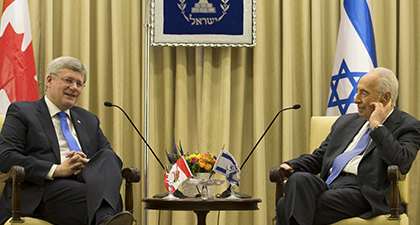JERUSALEM — Israeli and Canadian journalists posed challenging questions today (Jan. 21) to Prime Minister Stephen Harper and his Israeli counterpart, Benjamin Netanyahu, at a joint press conference held at the latter’s office in Jerusalem.
Two reporters, one from each country, tried to pin Harper down on the issue of West Bank settlements, on which he hasn’t spoken publicly since he arrived in Israel Jan. 19.
“I think it’s interesting,” Harper said. “When I’m in Israel, I’m asked to single out Israel, when I’m in the PA, I’m asked to single out Israel. Half the places in the world, I’m asked to single out Israel.”
Harper implied that he had raised the topic in private discussions with Netanyahu, finding it “more productive to discuss [this] in private settings where we’re able to exercise much more positive influence.”
Official Canadian policy on the West Bank communities – known in the international community as “settlements” despite the fact many are well-established Jewish cities – states that “Israeli settlements… are a violation of the Fourth Geneva Convention. The settlements also constitute a serious obstacle to achieving a comprehensive, just and lasting peace.”
But Netanyahu stepped in to argue, articulately and at length, in English, that the settlements are not at the core of the current conflicts in the Middle East.
There are two prevailing myths when it comes to popular opinion on the region, he said. “Until recently, everybody who knew anything… insisted that the core of the conflict in the Middle East was the Palestinian problem.”
Today, as countries around Israel are “imploding” following the Arab Spring, including Syria, Lebanon and Libya, Netanyahu said, “you’d be laughed out of most places – I’m not sure about Concordia University – if you argue this.”
He said the truth has become clear: “This has nothing to do with the Israeli-Palestinian conflict.”
Given the deflation of the first myth, a second has arisen, that “the core of the current conflict is basically the settlements,” an issue on which, he acknowledged, “Canada has a different position from Israel.”
“It has to be resolved,” said Netanyahu. “And it will be resolved – in the context of peace negotiations.” But he pointed out that conflict reigned in the area as far back as 1920, long before the settlements existed.
And when the Israeli government co-operated in a “textbook” fashion in Gaza, clearing out Jewish settlements, he said, referring to the 2005 pullout from territory, “We didn’t get peace… what we got are 16,000 rockets from Gaza alone” into Israel.
“Hamas is not interested in settlements, territory, 1967 borders… they got it. Hamas is interested in eliminating Israel.”
The true core of the conflict is the Palestinians’ “persistent refusal to reconcile to an independent nation-state of the Jewish People,” Netanyahu said.
He added that such an acknowledgement must come if there is to be any hope for a two-state solution. If Israel is forced to recognize a nation-state for the Palestinian people, “surely they can recognize a nation-state for the Jewish People. After all, we’ve only been here for four millennia.”
The question-and-answer session followed prepared statements from both leaders, beginning with Netanyahu, who praised Harper for his Knesset speech the previous day. “It will be remembered for a long time for its truthfulness and for its courage.”
Harper received a shower of praise from Israeli media the day after his address, lauding the heroism, wisdom and foresight in his talk.
This was in contrast to the lukewarm-at-best reception he’s received from Canadian media, who have hounded Harper virtually since he left Canada for a firm statement on the settlements – an imperative that, ultimately, he managed to dodge in the question-and-answer session by claiming Canada’s stance on the settlements is “a matter of public record.”
Netanyahu said the most urgent question on the table during his private meeting with Harper was not the settlements or even Israel’s ongoing security, but the potentially serious situation emerging in Iran, which he said could turn the entire Middle East “into a nuclear tinder box,” arming “the world’s most dangerous regime with the world’s most dangerous weapons.”
In his Knesset speech, Harper reiterated Canada’s commitment to continue its program of sanctions against Iran.
The press conference followed the signing of a memorandum of understanding between Canada and Israel agreeing to update the 1997 Canada-Israel Free Trade Agreement.
Harper’s meeting with Netanyahu came after a one with Israeli President Shimon Peres earlier in the day at the president’s office in Jerusaelm.
